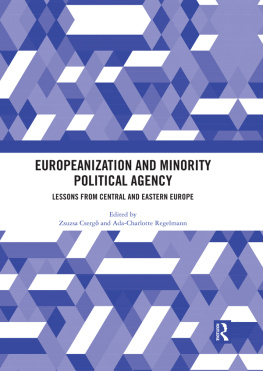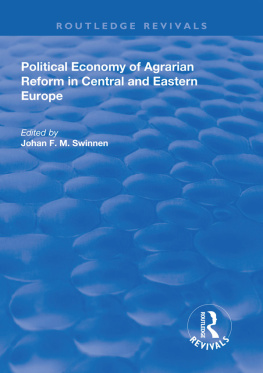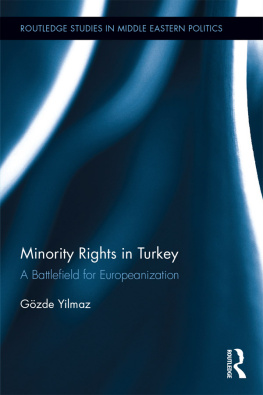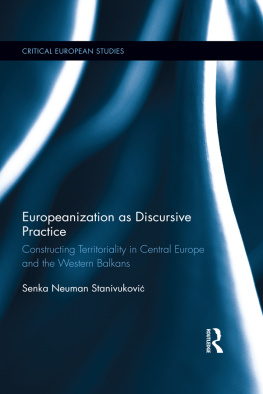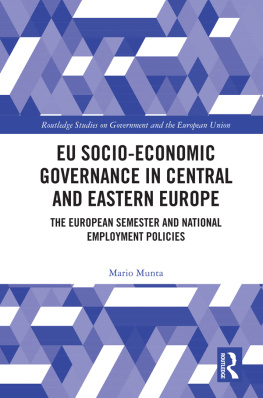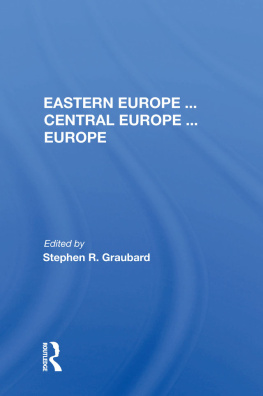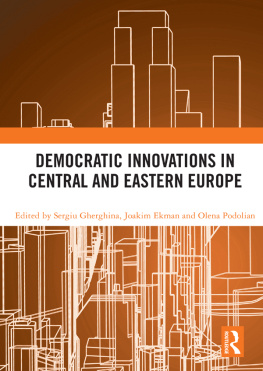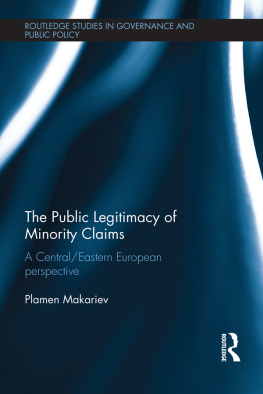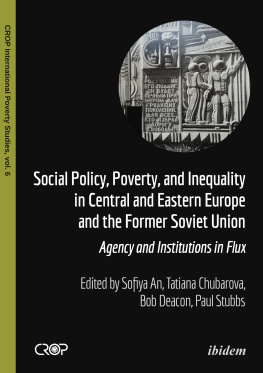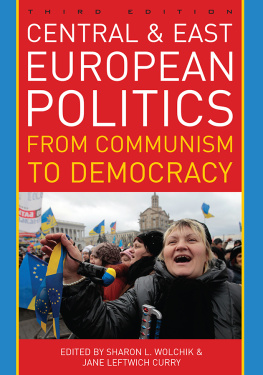Europeanization and Minority Political Agency
It is widely acknowledged that Europeanizationconceived as both the physical expansion of the European Union (EU) and the larger diffusion of European norms and practiceshas had a profound influence on ethnic relations in post-Communist Europe. A rich body of literature has emerged about this impactfocusing primarily on the evolution of European documents; state policies adopted during the process of EU accession; and changes in the triangular relations between minorities, the states in which they live, and the kin-states engaged in their mobilization. Yet the important question of how these processes impact the mobilizational patterns and political agency of ethnic minority actors has received little attention. This book directs attention squarely to that question. The contributions, authored by some of the best-known scholars in this field, demonstrate that Europeanization has a deep impact on minority political interests, abilities, and modes of action. Although minority actors remain in a structurally disadvantaged position, the institutions emerging through European integration have created important opportunities in multiple arenas domestically and externally. Rather than simply responding to policies, minority actors have sought to shape the scope of institutions and policies, participating peacefully and pragmatically in contestations over the meaning and forms of democratic integration.
The chapters in this book were originally published in a special issue of Problems of Post-Communism.
Zsuzsa Cserg is an Associate Professor and the Head of the Political Studies Department at Queens University, Kingston, Canada. She is also the President of the Association for the Study of Nationalities. Her research addresses questions of nationalism, democratization, and the influence of EU integration on stateminority relations in post Cold War Europe.
Ada-Charlotte Regelmann is a Project Manager at Rosa Luxemburg Stiftung, Berlin, Germany, focusing on the social inclusion of marginalized groups in European societies. Earlier, she was a Lecturer at Queens University Belfast, UK and Maynooth University, UK. Her research explores the impact of Europeanization on nation-state building and social integration in post-Communist Europe.
First published 2019
by Routledge
2 Park Square, Milton Park, Abingdon, Oxon, OX14 4RN, UK
and by Routledge
711 Third Avenue, New York, NY 10017, USA
Routledge is an imprint of the Taylor & Francis Group, an informa business
2019 Taylor & Francis
All rights reserved. No part of this book may be reprinted or reproduced or utilised in any form or by any electronic, mechanical, or other means, now known or hereafter invented, including photocopying and recording, or in any information storage or retrieval system, without permission in writing from the publishers.
Trademark notice: Product or corporate names may be trademarks or registered trademarks, and are used only for identification and explanation without intent to infringe.
British Library Cataloguing-in-Publication Data
A catalogue record for this book is available from the British Library
ISBN13: 978-1-138-61440-6
Typeset in Times New Roman
by codeMantra
Publishers Note
The publisher accepts responsibility for any inconsistencies that may have arisen during the conversion of this book from journal articles to book chapters, namely the possible inclusion of journal terminology.
Disclaimer
Every effort has been made to contact copyright holders for their permission to reprint material in this book.
The publishers would be grateful to hear from any copyright holder who is not here acknowledged and will undertake to rectify any errors or omissions in future editions of this book.
Contents
Zsuzsa Cserg and Ada-Charlotte Regelmann
Peter Vermeersch
Myra A. Waterbury
Szabolcs Pogonyi
Jennie L. Schulze
Licia Cianetti and Ryo Nakai
Zsuzsa Cserg and Ada-Charlotte Regelmann
The chapters in this book were originally published in the journal Problems of Post-Communism , volume 64, issue 5 (SeptemberOctober 2017). When citing this material, please use the original page numbering for each article, as follows:
Introduction
Europeanization and Minority Political Action in Central and Eastern Europe
Zsuzsa Cserg and Ada-Charlotte Regelmann
Problems of Post-Communism , volume 64, issue 5 (SeptemberOctober 2017) pp. 215218
Chapter 1
How Does the EU Matter for the Roma?
Transnational Roma Activism and EU Social Policy Formation
Peter Vermeersch
Problems of Post-Communism , volume 64, issue 5 (SeptemberOctober 2017) pp. 219227
Chapter 2
National Minorities in an Era of Externalization
Kin-State Citizenship, European Integration, and Ethnic Hungarian Minority Politics
Myra A. Waterbury
Problems of Post-Communism , volume 64, issue 5 (SeptemberOctober 2017) pp. 228241
Chapter 3
Europeanization of Kin-Citizenship and the Dynamics of Kin-Minority Claim-Making: The Case of Hungary
Szabolcs Pogonyi
Problems of Post-Communism , volume 64, issue 5 (SeptemberOctober 2017) pp. 242256
Chapter 4
Does Russia Matter?
European Institutions, Strategic Framing, and the Case of Stateless Children in Estonia and Latvia
Jennie L. Schulze
Problems of Post-Communism , volume 64, issue 5 (SeptemberOctober 2017) pp. 257275
Chapter 5
Critical Trust in European Institutions
The Case of the Russian-Speaking Minorities in Estonia and Latvia
Licia Cianetti and Ryo Nakai
Problems of Post-Communism , volume 64, issue 5 (SeptemberOctober 2017) pp. 276290
Chapter 6
Europeanization and Collective Rationality in Minority Voting
Lessons from Central and Eastern Europe
Zsuzsa Cserg and Ada-Charlotte Regelmann
Problems of Post-Communism , volume 64, issue 5 (SeptemberOctober 2017) pp. 291310
For any permission-related enquiries please visit:
http://www.tandfonline.com/page/help/permissions
Licia Cianetti is a Teaching Fellow in Politics at Royal Holloway, University of London, UK. Her research deals with minority politics, democratic representation, quality of democracy, inequality, and Central and Eastern European politics. She is also Senior Research Associate at Canterbury Christ Church University, UK.
Zsuzsa Cserg is an Associate Professor and the Head of the Political Studies Department at Queens University, Kingston, Canada. She is also the President of the Association for the Study of Nationalities. Her research addresses questions of nationalism, democratization, and the influence of EU integration on stateminority relations in post Cold War Europe.
Ryo Nakai is an Associate Professor in the Department of Policy Studies at the University of Kitakyushu, Fukuoka, Japan. His research interests include democratic competition and ethnic policy/nationalism, comparative study of political party system change, Eastern European expansion, domestic politics in EU countries, and EU politics as a whole.
Szabolcs Pogonyi is an Associate Professor in the Nationalism Studies Program at Central European University, Budapest, Hungary. His current research focuses on diasporic nation building, trans-border minorities, non-resident citizenship, and external voting. He is the author of several articles in political theory and editor of books in the history of political thought.

